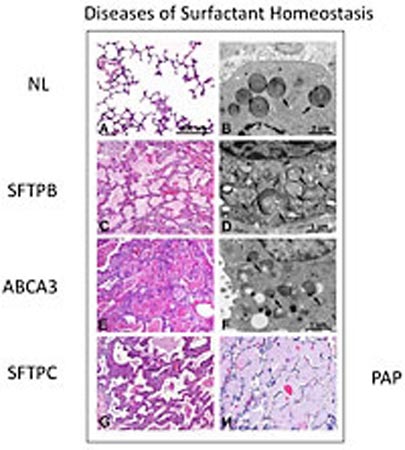Dr. Whitsett is on Doximity
As a Doximity member you'll join over two million verified healthcare professionals in a private, secure network.
- Gain access to free telehealth tools, such as our “call shielding” and one-way patient texting.
- Connect with colleagues in the same hospital or clinic.
- Read the latest clinical news, personalized to your specialty.
Office
3333 Burnet Ave # 7029
Cincinnati, OH 45229
Summary
- Dr. Whitsett's laboratory discovered surfactant proteins B and C, cloned the genes encoding the surfactant proteins A, B, C, and D, Scgb1a1, TTF-1 and others and utilized transgenic mouse models to delete and mutate these genes in transgenic mice. They identified transcriptional networks regulating lung morphogenesis and perinatal lung maturation contributing to the understanding of the roles of TTF-1, CEBPα, SOX2, SOX17, FOXA1, FOXA2, FOXA3, SPDEF, KLF5, CDC42 and others using both in vitro and in vivo methods. They identified multiple transcription factors regulating goblet cell differentiation airway epithelial cells including critical role of SPDEF, FOXA3 and airway goblet cells controlling innate immunity. They produced transgenic mouse models for conditional deletion and expression of genes involved in lung development, disease, and repair. They have generated transgenic models of pulmonary adenocarcinoma and explored the role of transcription factors mediating pulmonary adenocarcinoma in vivo and in vitro. They utilized RNA-Seq, microarray, Chip-Seq in the application of Nex-Gen sequencing and bioinformatics to identify and understand networks involved in the regulation of lung development and disease using clinical sample, as well as in vitro and in vivo models.
Dr. Whitsett has a long interest in training both in the clinical setting in “Neonatology” and in “Pulmonary Biology” and has contributed to the direct training of more than 80 graduate or post-graduate students in his laboratory. The scope of his work is represented in several recent reviews. Initial discoveries from his laboratory provided early insights into the genes and proteins critical for surfactant function including ABCA3, SFTPC, SFTPB, SFTPA, SFTPD.
Education & Training
 Cincinnati Children's Hospital Medical CenterFellowship, Neonatal-Perinatal Medicine, 1976 - 1978
Cincinnati Children's Hospital Medical CenterFellowship, Neonatal-Perinatal Medicine, 1976 - 1978 Icahn School of Medicine at Mount Sinai/Kravis Children'sResidency, Pediatrics, 1973 - 1976
Icahn School of Medicine at Mount Sinai/Kravis Children'sResidency, Pediatrics, 1973 - 1976 Columbia University Vagelos College of Physicians and SurgeonsClass of 1973
Columbia University Vagelos College of Physicians and SurgeonsClass of 1973
Certifications & Licensure
 OH State Medical License 1978 - 2025
OH State Medical License 1978 - 2025- American Board of Pediatrics Pediatrics
- American Board of Pediatrics Neonatal-Perinatal Medicine
Awards, Honors, & Recognition
- 2018 Edward Livingston Trudeau Medalist American Thoracic Society, 2018
- P&S Alumni Gold Medal Award Columbia University, 2018
- Virginia Apgar Award American Academy of Pediatrics, 2015
- Join now to see all
Publications & Presentations
PubMed
- Novel Immune Response Evasion Strategy to Redose Adeno-associated Viral Vectors and Prolong Survival in Surfactant Protein-B Deficient Mice.Martin H Kang, Sylvia P Thomas, Caralyn Westley, Thomas Blouin, Liqun Xu
American Journal of Respiratory Cell and Molecular Biology. 2025-01-13 - Impact of Viral Lower Respiratory Tract Infection (LRTI) in Early Childhood (0-2 Years) on Lung Growth and Development and Lifelong Trajectories of Pulmonary Health: A...Hitesh Deshmukh, Jeffrey Whitsett, William Zacharias, Sing Sing Way, Fernando D Martinez
Pediatric Pulmonology. 2025-01-01 - Mildred T. Stahlman, MD-Neonatal trailblazer lived simple life in Tennessee, devoted to friends, colleagues, and patients.Corey Nason Reese, Jeff Reese, Jeffrey A Whitsett
Pediatric Research. 2024-12-09
Press Mentions
 Defective Mesenchymal Bmpr1a-Mediated BMP Signaling Causes Congenital Pulmonary CystsJune 10th, 2024
Defective Mesenchymal Bmpr1a-Mediated BMP Signaling Causes Congenital Pulmonary CystsJune 10th, 2024 Fgf10 Signaling-Based Evidence for the Existence of an Embryonic Stage Distinct from the Pseudoglandular Stage During Mouse Lung DevelopmentOctober 22nd, 2020
Fgf10 Signaling-Based Evidence for the Existence of an Embryonic Stage Distinct from the Pseudoglandular Stage During Mouse Lung DevelopmentOctober 22nd, 2020
Viewing the full profile is available to verified healthcare professionals only.
Find your profile and take control of your online presence:












